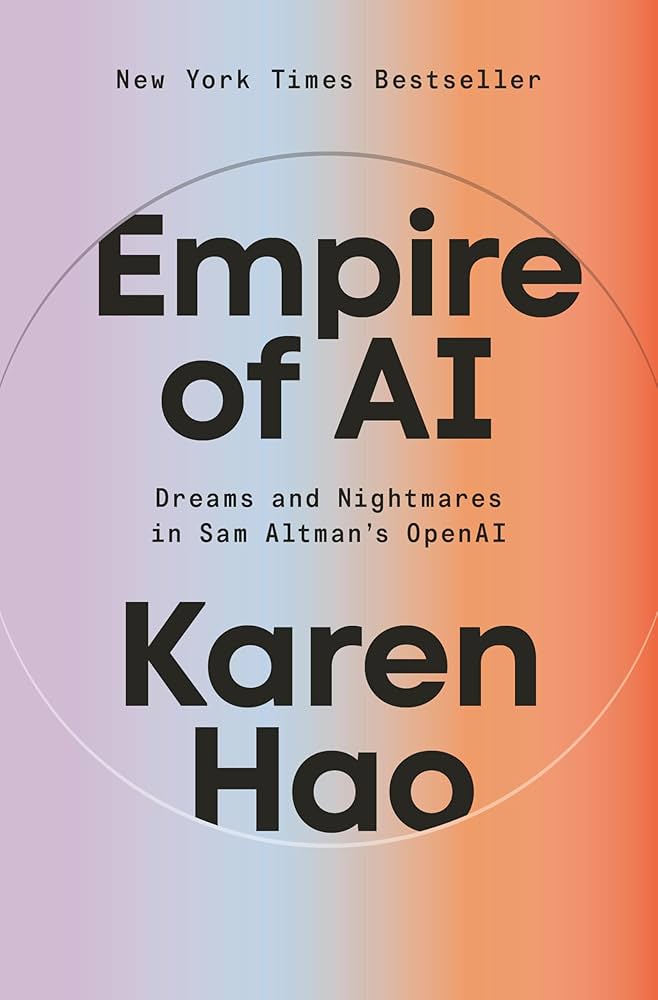
Framed through a historical lens of imperial ambition, ‘Empire of AI: Dreams and Nightmares in Sam Altman’s OpenAI’ raises an urgent question: Is the AI race simply a new form of global domination?
In ‘Empire of AI: Dreams and Nightmares in Sam Altman’s OpenAI’, journalist Karen Hao delivers a meticulously reported, chillingly resonant account of the meteoric rise of OpenAI, and the potential fallouts of our unchecked technological ambition. With over 300 interviews conducted across years of reporting on the AI industry, Hao pulls back the curtain on the secretive decisions, global implications, and internal dramas behind the most influential AI company in the world.
OpenAI and the “Civilising Mission”
Hao structures the book in four key parts, each designed to mirror the history of empires:
- Divine Right & Civilising Mission
- Ascension & Disaster Capitalism
- Gods and Demons & Plundered Earth
- Reckoning & Empire Collapse
She draws parallels between 18th- and 19th-century colonial empires and the present-day AI rush—especially the push toward Artificial General Intelligence (AGI), spearheaded by OpenAI and its co-founder Sam Altman.
OpenAI, originally established as a nonprofit dedicated to the safe and transparent development of AI, quickly pivoted to a “capped-profit” model to attract investment—most notably, billions from Microsoft. In doing so, Hao argues, it shed its “open” ethos in favour of secrecy, scale, and speed. The company’s declared mission to “benefit humanity” has, in her view, become a fig leaf for consolidating power and wealth.
Sam Altman: Tech Messiah or Empire Architect?
Sam Altman emerges as both protagonist and antagonist in Hao’s narrative. From his early days at Y Combinator to being the face of OpenAI, Altman comes across as a sharp strategist—someone who genuinely believes in building a better future, but isn’t afraid to play hardball to get there.
Hao dives into both Altman’s big wins and the controversies that followed him—especially the dramatic events of 2023, when he was briefly pushed out by OpenAI’s board over growing concerns about AI safety and how the company was being run. The internal showdown, fueled by fears from researchers like Ilya Sutskever that OpenAI might be losing control of its technology, reads like a real-life tech thriller.
Altman’s return to power, backed by Microsoft and employees, was swift and symbolic: Hao paints this as the moment OpenAI truly became a corporate empire, no longer answerable to its founding ideals.
The Ethics Black Hole
One of the book’s most important contributions is its exposé of the hidden labour, environmental costs, and moral contradictions that fuel the AI boom.
1. Data Colonialism – OpenAI’s large language models are trained on massive datasets, scraped from across the internet, often without consent or compensation. Artists, writers, and journalists—especially from the Global South—find their intellectual property absorbed into corporate AI engines without acknowledgement.
2. Invisible Labour – Karen Hao uncovers harsh working conditions for data annotators in Kenya, the Philippines, and Venezuela—some paid less than $2 an hour to filter disturbing content like graphic violence and sexual abuse. This labour is essential to training “safe” AI, yet it remains uncredited and underpaid.
3. Environmental Damage – Training large AI models requires extraordinary amounts of energy and water. Hao draws comparisons between OpenAI’s compute usage and the water needs of major cities. She highlights a planned data centre in Chile that could threaten fragile ecosystems.

A New Religion: The Cult of AGI
Through her reporting, Hao surfaces a powerful observation: AGI has become a secular religion in Silicon Valley. Its adherents—like Altman and Sutskever—speak in prophetic terms, promising salvation or doom.
Hao paints a curious picture of OpenAI’s internal culture—complete with strange rituals like chanting at company parties and heated debates over ideas like alignment and superintelligence. She suggests that the atmosphere has grown increasingly rigid, almost cult-like, where questioning the mission isn’t welcome and ethical concerns often take a back seat to the belief that they’re on a world-changing path.
The narrative of OpenAI as a “protector” of the world from AI gone rogue—while simultaneously being the one building it—is portrayed as inherently self-serving and dangerously unregulated.
Technical Simplicity, Strategic Depth
This is not a technical book about transformers, tokenisation, or optimisation algorithms. While she briefly explains concepts like GPT (Generative Pre-trained Transformer), RLHF (Reinforcement Learning from Human Feedback), and alignment research, the focus remains firmly on people, politics, and power.
For readers new to AI, this makes the book accessible. For AI experts or practitioners, the strategic lens—on scaling laws, compute monopolies, and governance breakdowns—is still intellectually rich, if less technically granular.
Strengths of the Book
- Deep Reporting: With over 300 interviews and firsthand access, the book reads like a well-researched biography and political thriller.
- Moral Clarity: Hao isn’t shy about calling out contradictions and hypocrisies in the AI world.
- Narrative Power: Characters are vividly drawn, events flow like a drama, and the reader is taken on a high-stakes journey into the world’s most controversial AI lab.
- Historical Framing: The colonial metaphor may feel bold, but it’s an effective rhetorical device to question modern AI hegemony.
Criticisms & Controversies
- Tone Bias: Some critics argue that the book is polemical and lacks neutrality. OpenAI’s contributions—like ChatGPT’s accessibility or AI-for-good programs—are underplayed.
- Personal Intrusion: Hao discusses allegations from Altman’s sister regarding childhood abuse. While relevant to public perception, some see this as ethically questionable.
- Simplification: The book avoids deeper exploration of technical counterarguments or the genuine difficulty of AI alignment and scaling ethics.
- Limited Global Lens: While data colonialism is a key theme, voices from the Global South could have been given more page time.
Reception & Impact
Since its release, Empire of AI has debuted on the New York Times Bestseller list. It has received glowing praise from The New Yorker, Wired, Tim Wu, and Kate Crawford. The book has sparked a debate in Silicon Valley circles over corporate transparency, AGI governance, and power centralisation. It is frequently compared with books like Atlas of AI by Kate Crawford and The Alignment Problem by Brian Christian, and is quickly becoming essential reading in AI ethics courses and tech journalism.
Final Verdict
A provocative, deeply reported work that lays bare the costs, contradictions, and chaos of the AI gold rush. While not perfectly balanced, its urgency and insight outweigh its flaws. For anyone trying to understand the present and future of AI, this book is non-negotiable.
Book Title: Empire of AI: Dreams and Nightmares in Sam Altman’s OpenAI
Author: Karen Hao
Publishers: Crown Publishing / Penguin Random House (2025)
Pages: 416
Price: ₹2,484 (Hard Cover) / ₹1,210 (Kindle)
SW Ratings: ****1/2

Raghvendra Tripathi is an independent researcher with a background in computer applications and a keen interest in technology and geopolitics. His articles focus on how emerging technologies influence international strategy, policy, and global power dynamics. Views expressed are the author’s own.
